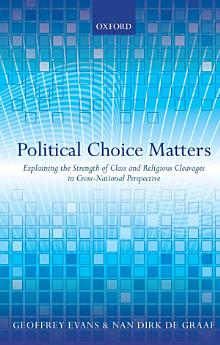Political Choice Matters: Explaining the Strength of Class and Religious Cleavages in Cross-National Perspective
Geoffrey Evans · Nan Dirk de Graaf
Mar 2013 · OUP Oxford
Ebook
480
Pages
family_home
Eligible
info
reportRatings and reviews aren’t verified Learn More
About this ebook
Political Choice Matters investigates the extent to which class and religion influence party choice in contemporary democracies. Rather than the commonly-assumed process in which a weakening of social boundaries leads to declining social divisions in political preferences, this book's primary message is that the supply of choices by parties influences the extent of such divisions: hence, political choice matters. Combining overtime, cross-national data, and multi-level research designs the authors show how policy and programmatic positions adopted by parties provide voters with choice sets that accentuate or diminish the strength of political cleavages. The book gives central place to the positions of political parties on left-right, economically redistributive and morally conservative versus social liberal dimensions. Evidence on these positions is obtained primarily from the Comparative Manifesto Project, with a chapter dedicated to elaborating and validating the various implementations of this uniquely valuable source of evidence on party positions. The primary empirical focus includes case studies of 11 Western, Southern, and Central European societies as well as 'anglo-democracies' including Britain, USA, Canada, and Australia. These detailed analyses of election studies ranging in some cases from the post-war period until the early part of the 21st century are augmented by a pooled cross-national and overtime analysis of 15 Western democracies using a unique, combined dataset of 188 national surveys. The authors show that although there has been some overtime decline in the strength of association between social class and party choice, this is far smaller than the amount of change in the relationship occurring as a result of party movements on questions of inequality and redistribution. The strength of the religiosity cleavage is also influenced by changes in party positions on moral issues - changes that can be understood as a strategic response to a process of secularization that has weakened the electoral viability of parties deriving support from appeals to religious values.
About the author
Geoffrey Evans' research interests include social divisions, inequality, and politics in Britain, models of voting behaviour, the evolution of class and ethno-religious cleavages, and democratic consolidation in postcommunist societies. In addition to many journal articles covering these topics he has produced several books including The End of Class Politics? (OUP 1999). He is University Professor and Official Fellow, Nuffield College, Oxford. Nan Dirk De Graaf's research interests include empirical sociology in general, social stratification, especially educational attainment and consequences of social mobility, cultural sociology, sociology of religion and pro-social behaviour, and political sociology and criminology. He is University Professor and Official Fellow Nuffield College, Oxford.
Rate this ebook
Tell us what you think.
Reading information
Smartphones and tablets
Install the Google Play Books app for Android and iPad/iPhone. It syncs automatically with your account and allows you to read online or offline wherever you are.
Laptops and computers
You can listen to audiobooks purchased on Google Play using your computer's web browser.
eReaders and other devices
To read on e-ink devices like Kobo eReaders, you'll need to download a file and transfer it to your device. Follow the detailed Help Center instructions to transfer the files to supported eReaders.






